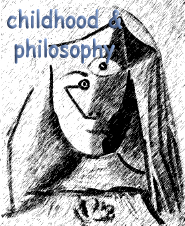hermeneutical injustice and outsourced domestic girl-child labour
DOI:
https://doi.org/10.12957/childphilo.2020.53130Keywords:
hermeneutical injustice, child-labour, child-rights, girl-childAbstract
We observed that despite international declarations on child-rights, outsourced domestic girl-child labour still persists. Raising the question whether outsourced domestic girl-child labour constitutes hermeneutical injustice, we respond affirmatively. Relying on two indigenous victimology-narratives that are newspaper reports, we expose some of the horrors that the victims of outsourced domestic girl-child labour suffer. Comparing these reports with other victimology-narratives of hermeneutical injustice as reported by Miranda Fricker and Hilkje Hänel, we argue that the victims of outsourced domestic girl-child labour suffer a hermeneutical gap and hermeneutical interference; and that the perpetuators of this practice, help to foster what we call ‘hermeneutical obstruction’. We recommend different counteracting measures such as: a radical feminization of educational curricula, which will allow for the introduction of the relevant hermeneutical resources that female children need in making sense of their experiences, into the classrooms and other places of learning; establishing feminist liberation agencies in all schools, religious institutions and hospitals, as ways of increasing the level of awareness about the rights of the girl-child in children and adults; feminizing legislation and legislative processes, to allow for the enactment of laws to protect the rights of the girl-child; and campaigning for a more rigorous enforcement of child-rights laws.
Downloads
References
Abakedi, D. E. A critique of metaphysical logical realism. Meta: Research in Hermeneutics, Phenomenology, and Practical Philosophy, 12 (1), 127-142.
Abraham, K. (2020). Crimes on women by women. Retrieved from Vanguard,
http://www.vanguardngr.com/2020/07/crimes-on-women-by-women.
Agra, K. L. R. P. (2020). Epistemic injustice, epistemic paralysis and epistemic resistance: A feminist liberatory approach to epistemology. Kritike, 14 (1), 28-44.
Agwam, C. (2020). Teenage wife kills husband over sex, says she didn’t know its’ marital obligation. Retrieved from Vanguard,
Baumtrog, M. D. (2018). Navigating a necessary inequality: Children and knowledge-based injustice. Alternate Routes: A Journal of Critical Social Research, 29,
http://www.alternateroutes.ca/index.php/ar/article/view/22459.
Begum, R. (2016). Migrant domestic workers: Overworked and underprotected. Women Across frontiers (4)
http://wafmag.org/201/migrant-domestic-workers-overworked-underprotected.
Birnbaum, R., & Saini, M. (2012). A qualitative synthesis of children’s participation in custody disputes. Research on Social Work Practice, 22 (4), 400-409.
Congdon, M. (2017). What’s wrong with epistemic injustice? Harm, vice, objectification and misrecognition. In M. Congdon, & I. James and J. Kidd (Eds.), The Routledge Handbook of Epistemic Injustice. New York: Routledge.
Crerar, C. (2016). Taboo, hermeneutical injustice, and expressively free environments. Episteme, 13 (2), 195-207.
Dotson, K. (2011). Tracking epistemic violence: Tracking practices of silencing. Hypatia: A Feminist Journal of Philosophy, 26 (2), 236-257.
Elzinga, B. (2018). Hermeneutical injustice and liberation education. The Southern Journal of Philosophy, 56 (1), 59-82.
Fricker, M. (2007). Epistemic injustice: Power and the ethics of knowing. Oxford: Oxford University Press.
Giladi, P. (2018). Epistemic Injustice: A role for recognition. Philosophy and Social Criticism, 44 (2), 141-158.
Goetze, T. (2018). Hermeneutical dissent and the species of hermeneutical injustice. Hypatia: A feminist Journal of Philosophy, 33 (1), 73-90.
Hull, G, (2017). Black consciousness as overcoming hermeneutical injustice. Journal of Applied Philosophy, (34) 4, 573-592.
International Justice Resource Center (IJRC). (2020). Child rights. Accessed July 20, 2020,
http://ijrcenter,org/thematic-research-guides/childrens-rights.
International Labour Organization (2013). World Report on child labour: Economic vulnerability, social protection and the fight against child labour. Geneva: International Labour Organization.
International Labour Organization (2020). What is child labour. Accessed July 17, 2020.
http://www.ilo.org/ipec/faacts/lang.
Keshky, M. E., & Samak, Y. A. A. (2017). The development of self-esteem in children: Systematic review and meta-analysis. International Journal of Psychology and Behaviour Analysis, 3, 128.
Kidd, I., Jose, M. & Pohlhaus, G., Eds. (2017). The Routledge handbook of epistemic injustice. New York: Routledge.
Maitra, I. (2018). New words for old wrongs. Episteme, 15 (3), 345-362.
Medina, J. (2017). Varieties of hermeneutical injustice. In I. J, Kidd, J. Medina, & J. G. Pohlhaus (Eds.), The Routledge Handbook of Epistemic Injustice (pp. 41-52). New York: Routledge.
Moors, A. (2003). Migrant domestic workers : Debating transnationalism, identity politics, and family relations, a review essay. Comparative Studies in Society and History, 45(2), 386-394.
Oluwagbemi-Jacob, Egbai, M. J., & Abakedi, D. E. (2018). A General Introduction to Feminist Philosophy: Studies in Feminist Philosophy http://www.amazon.com/General-introduction-Feminist-Philosoph-PhilPhuilosophy/dp/1726434966.
Podolsky, P. (2018). Hermeneutical injustice and animal ethics. Can non-human animals suffer from hermeneutical injustice? Journal of Animal Ethics, 8 (2), http://doi.org/10.5406/janimalethics.8.2.0216.
Richer, P. & de Coninck, S. (2015). Responsible finance and child labour: Quo vadis microfinance? Enterprise Development and Microfinance, 26 (2), 158-174.
Shahvisi, A. (Forthcoming). Hermeneutical injustice and outsourced domestic work. Women’s Studies International.
Tundui, C. S., & Tundui, H. P. (2018). Examining the effect of child labour in the profitability of women owned enterprises: a case of microcredit supported enterprises in Tanzania. Journal of Global Entrepreneurship Research, 8 (2), http://doi.org/10.1186/540497-018-0088-4.
United Nations Children Fund (UNICEF) (2020). Legislative reform on child domestic Labour: A gender analysis. United Nations Children Fund (UNICEF).
Usman, E. (2020). Maids as glorified slaves in in Nigeria. Retrieved from Vanguard:
http://www.vanguardngr.com/2020/02/maids-as-glorified-slaves-in-nigeria.




